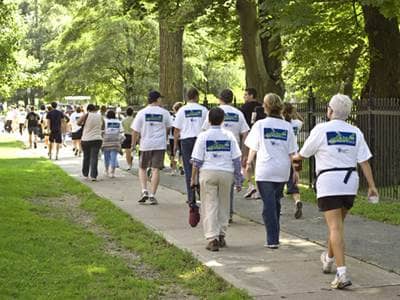Beyond Blue: The Lessons of Depression

Four years ago, I almost gave up.
After trying 23 medication combinations, seven psychiatrists, two hospitalization programs, and every form of alternative therapy available--from homeopathic remedies to yoga--I assumed I was one of those unfortunate statistics with treatment-resistant depression, a Humpty Dumpty type who would never recover from the fall of a nervous breakdown.
There was no magic that happened between then and now, the day my book about my recovery hits the shelves. I just kept on getting out of bed. Even on the days where my thoughts were cemented in the black stuff, in negativity and toxic emotions, I tried to pick up one foot and place it in front on the next.
Here are the tools I picked up along the way, the 12 basic lessons that help me in my mission to stay "Beyond Blue," or at least out of black for as long as possible.
Therese J. Borchard writes the Beyond Blue blog on Beliefnet. Her new book, also called Beyond Blue, has just been published.
Laugh

From my 12 years of therapy I have learned at least one thing: I use sarcasm as a defense mechanism. But I'm keeping the jokes and the acerbic tone because Abe Lincoln and Art Buchwald, two of my mental health heroes, said wit was essential to sanity, that comedy can keep a person out of the psych ward (not really). And if you're laughing, you're not crying... even though the two look similar from 10 feet away.
Sweat

As a recovering addict, I love any buzz I can get. Working out--any exercise that gets my heart rate over 140 beats per minute (into the cardiovascular zone)--does the job. And in a safe way, so I don't have to cheat on my sobriety. I'm probably as addicted to exercise as I was to booze, but this is one mood-altering activity that doesn't damage my marriage and my other relationships.
The right kind of exercise actually acts like an antidepressant: increasing the activity of serotonin and/or norepinephrine in your brain and releasing those coveted endorphins and other hormones that reduce pain, induce euphoria, have a calming effect, and combat stress.
Eat the Right Stuff

The more I investigate--both through research and nonscientific experiments with my own body--the more I realize how my diet affects my mood.
Here are the bad boys: nicotine, caffeine (it's a drug, which is why I'm addicted to it), alcohol, white flour and processed food (what you live on when you have kids who won't touch tofu and spinach); and sugar... that's a whole other article.
Here are the good guys: protein (eggs, milk, cheese, yogurt, meat, fish, chicken, seeds, nuts); complex starches (whole grains, beans, potatoes); vegetables (broccoli, spinach, squash); vitamins (vitamin B-complex, vitamins E and C, and a multivitamin); minerals (magnesium, calcium, and zinc); and omega-3 fatty acids.
Sleep

Sleep is crucial to sanity. Let me repeat: sleep is crucial to sanity.
Because sleep disturbances can contribute to, aggravate, and even cause mood disorders and a host of other illnesses. You see, if you're not sleeping, your brain doesn't have an opportunity to do all the stuff it needs to do without the constant interruption of your thoughts. The brain works the night shift. And when it doesn't get all the work it needs to do done...well, it gets a tad irritable, like you do when you can't get your work done. And it takes it out on you.
According to one recent study, sleep deprivation can cause a decline in cognitive performance similar to the intoxicated brain. That's right! Drunks can reason and judge better than you if you've gone too long without getting some zzzzs.
Light Up

Have you ever noticed all the crabby behavior in November and December, not to mention into the deep dark winter months?
Changes in the amounts of daylight a person gets alters circadian rhythms, the internal biological clock which governs fluctuation in body temperature and the secretion of several hormones, including the evil one, cortisol. When a person gets less daylight than she needs, her circadian rhythm starts to act like a high-maintenance houseguest--getting all flustered over small stuff (i.e. the wrong kind of soap). That's why treatment with light is so effective for fragile human beings like me. If I can't get outside for at least a half hour a day, I try to sit under my mammoth Happy Lite, a lamp with 10,000 lux, and think happy thoughts.
Rely on Friends

I used to be a loyal support-group kind of girl. But since I've had kids, getting to meetings is much more difficult. So I've found my support in other ways--in phone calls and e-mails and visits to friends and relatives who also suffer from depression or bipolar disorder. That lifeline kept me alive during my suicidal days, and continues to empower me every single day.
During the darker days of my depression, I walked around with six phone numbers in my pocket. Because I didn't want to wear out any one friend or relative, I'd call two people a day, and rotate the numbers. I spent hours on the phone and writing e-mails and visiting friends because I needed constant support.
Get Involved

Positive psychologists like University of Pennsylvania's Martin Seligman and Dan Baker, Ph.D., director of the Life Enhancement Program at Canyon Ranch, believe a sense of purpose--committing oneself to a noble mission--and acts of altruism are strong antidotes to depression. I used to think that meant that I needed to carve out two hours in my schedule every week to serve soup at the homeless shelter. But in the three years that I've written the Beyond Blue blog, I've come to think of that as my special ministry or contribution to the world. And yes, it does fulfill me more so than I ever dreamed possible.
Keep a Gratitude Journal

Based on her research findings, University of California psychologist Sonja Lyubomirsky believes that keeping a gratitude journal is one of the most effective happiness boosters. According to psychologist Robert Emmons at the University of California at Davis, gratitude exercises improves physicalhealth, as well--including raising energy levels and relieving pain. During my suicidal days, I'd write in my journal that I was thankful for a bagel and cream cheese in the morning, a husband who held me when I cried, a literary agent who didn't dump me once she found out about my “vacation” at the psych ward. Today I record things like: full-day kindergarten, getting paid to whine online, and a spouse who knows how to cook (because I sure as heck don't).
Go to Therapy

In her classic, "An Unquiet Mind," Kay Redfield Jamison says that therapy and medication are the two pillars of her mental-health program. Yep. Agreed. Even as therapy is totally inconvenient to my hectic schedule, I make myself go. Because issues left unattended have a way of smelling after a few weeks. And even when I think I'm in a good spot ... fooling myself into thinking that I can just coast for a little bit ... a resentment will make an uncanny surprise visit to remind me of the many character defects I could work on.
Work on Those Thoughts

This one is the toughest steps: directing my thoughts is somewhat like a traffic policeman standing out in the middle of a highway during a storm. Some of the drivers (thoughts) get a bit agitated when the dude in the neon vest tells them they can't go a certain way...that if they do, they will regret it. Oh yes, they will. Because getting their brains out of the gutter (where toxic emotions live) proves more difficult than you think. I have a bunch of creative ways--much like the policeman's hand signals--in which I like to untwist my distorted thoughts...such as differentiating between fiction (fantasy) and nonfiction (reality) in my busy noggin.
Pray or Meditate

Sometimes this is easier than at other times. And I do it in many forms--as mantras ("I am enough," "I am loved," "Peace...") during my runs, or a quiet ten minutes in my bedroom with a lit candle and a Bible verse, or singing "Alleluia!" with a congregation of Catholics at church on Sunday, or meditating in lotus pose at ayoga class, or simply as a vague consciousness of the divine presence as I'm folding the laundry.
Surrender

There are times, though, when none of my tools works. Then there is nothing left for me to do but surrender. I have to tell my neurotic brain that I let go of trying to make it happy. And I wait...sometimes a day or a week, other times a month or more, to feel better. But I eventually do. I always do. And so will you.